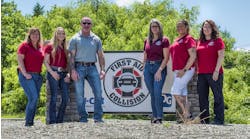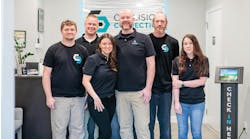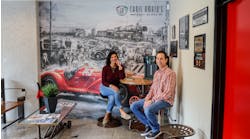Taking the risk to close one shop to concentrate on another brings rewards
Many business owners might wish that they faced the same challenge as Lee Amaradio, owner of Faith Quality Auto Body of Murrieta, Calif.—how to manage rapid growth that never seems to slow down. But the good fortune did not occur without some risk.
Amaradio opened his first shop 60 miles away in Mission Viejo, Calif., in 1979 in leased space. The business was successful, but experienced large rent increases every year. Amaradio realized he could have more control over his own destiny if he bought his own shop. But because the Mission Viejo area was so expensive, Amaradio opted to buy in Murrieta, where he opened in 1990. For three years, Amaradio operated both shops, but the 60-mile distance between them was a challenge to manage. In 1993, Amaradio made a critical decision—to close the more established Mission Viejo shop and concentrate solely on the Murrieta shop.
That decision turned out to be a smart one. In the 1990s, the Murrieta area saw a huge increase in population—and that upward trend hasn’t stopped yet. Of course, opportunities like that don’t remain secret for long. But even though other collision repair shops have followed Amaradio’s lead and opened shops in the area, Faith has maintained an exceptional growth rate. Amaradio has accomplished that feat largely through effectively delegating to a talented five-person managerial staff and through a willingness to constantly examine operations and rethink priorities as circumstances have changed.
“We’ve grown 25 percent to 30 percent a year,” Amaradio says. “We’re on the leading edge of how to run a business.” As larger and larger body shops have begun to emerge, Amaradio’s shop has remained among the largest. “My main function is to watch the big picture,” Amaradio says. “If you try to micromanage, you’ll fail. You have to make people accountable by department.”
One of Amaradio’s most useful tools, he says, is a program he calls “manage your managers” that was developed by Ken Webb Marketing and Consulting with Amaradio’s help and is now available to other large shops. The software provides a wide range of
detailed reports, such as how much business each estimator has written and sold, the average cost per claim and the results of customer satisfaction surveys.
“Each week we have two meetings,” Amaradio says. “I run the meeting and we go over the reports. If two estimators are doing $25,000 and one is doing $6,000, I might find out that there were two $8,000 jobs that customers didn’t pick up that would have made the numbers better for that one estimator.”
There is a downside to growing larger, however. As Faith has grown, its profit margins have declined—a trend that Amaradio attributes to two things.
First, any small problem is magnified by Faith’s sheer volume of business. “If you have 78 guys all wasting $15, it adds up quickly,” Amaradio says. The Ken Webb software is helpful in identifying such issues. “When you get to be the size we are, you have to know everything that’s going on,” Amaradio says. “No longer do the big things kill you, it’s the little things.”
Secondly, because Faith has never stopped growing, it has been on a continuous learning curve. As soon as Amaradio determines how best to manage the company for a given sales volume, that volume seems to increase and the company again has to rethink its processes.
A big advantage of growing larger, however, is that Amaradio has been able to take advantage of high levels of specialization. “We’re like five small body shops inside one, making up one giant production force,” Amaradio says. Writers specialize in certain insurance accounts and, with the help of its paint supplier, Faith has set up separate paint booths for jobs requiring painting one, two or three panels. Having separate paint booths eliminates waiting times for small jobs that might otherwise get caught behind a larger job.
The company also has different methods of treating large jobs (those involving $6,000 or more worth of damage) and smaller jobs (valued at less than $6,000). Technicians working on large jobs are Faith’s most experienced, and unlike technicians working on smaller jobs who are paid per job, the technicians devoted to the large jobs receive a salary. “Their job is to do perfect work,” Amaradio says of the large job technicians. If, instead, larger jobs are paid on a commission basis, Amaradio finds that technicians tend to rush through the work to ensure that they have payment coming.
Faith also helps ensure it does a quality job by devoting one staff person to act as certification chief. “He reads the estimate line for line and checks off the estimate to make sure each new part is on the car,” Amaradio says. “He’s trained to be a picky customer and to critique the work per our shop standards.”
Sometimes those standards are stricter than those of a customer’s insurance company. “We do the work the same no matter what the insurance company will pay,” Amaradio says. “If we do good work, the money will come later.” By reasoning with insurance companies, Faith has sometimes been successful in getting them to raise their standards. Generally, friction occurs only when the insurance company insists that work be performed in a manner that Faith feels is inappropriate. “Then we tell the customer, ‘We can’t come to terms with your insurance company unless you authorize us to do sub-standard work,’” Amaradio says.
Maintaining strong relationships with insurance companies is especially important for Faith because its business is 100 percent direct repair process. “We do a high quality repair and can get the car out the door quickly,” Amaradio says. “We make sure it’s cost effective for the insurance company without shorting the customer. We give concessions, but they’re pretty minimal—a labor rate discount, but no parts discount.”
Faith also uses customer satisfaction research to help ensure that its quality levels remain high. Customers must complete a survey card in order to receive a warranty card, which ensures a high response rate. A manager from Faith follows up with a phone call to any customers who were not happy with their experience.
Motivated employees have helped fuel Faith’s ongoing growth. Estimators are eligible for weekly, monthly, quarterly and yearly bonuses. Each week, one estimator gets a $50 bonus based on several factors, including volume and customer satisfaction measurements. There is also a $100 bonus for the highest performer each month. The highest performer for the quarter gets an all-expenses-paid local vacation—and the highest performer for the year gets a trip to any international destination.
Amaradio has begun to think again about opening more locations. Ideally, he says, he’d like to open five so that each of his managers could manage his own shop. Until then, his goal is to hit revenues of $8 million for 2004—up from $7 million in 2003. “I’d like to add accounts and writers, expand inside, and see the bottom line go up,” says Amaradio
Snapshop
Name and location: Faith Quality Auto Body, Murrieta, Calif.
2003 sales: $7.1 million
Volume: 250-300 repairs/month
Size: 28,000 sq. ft.




